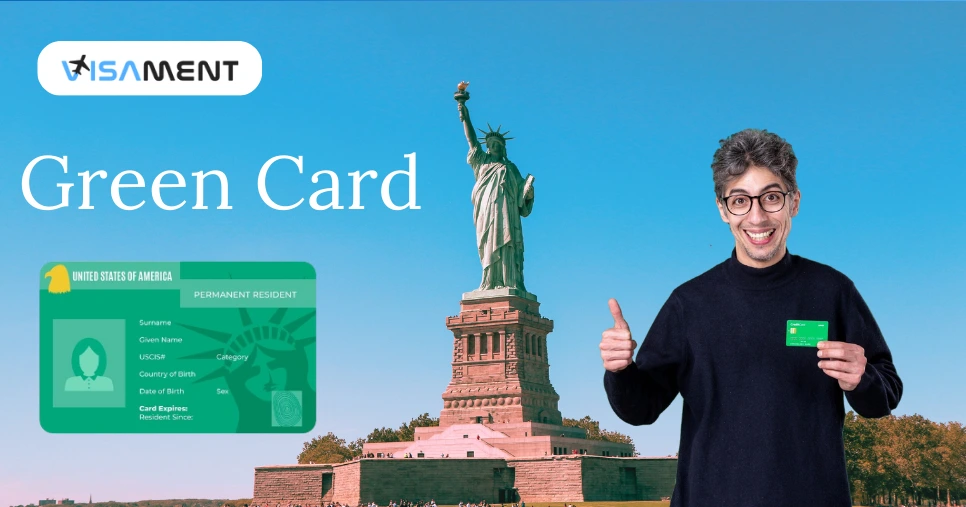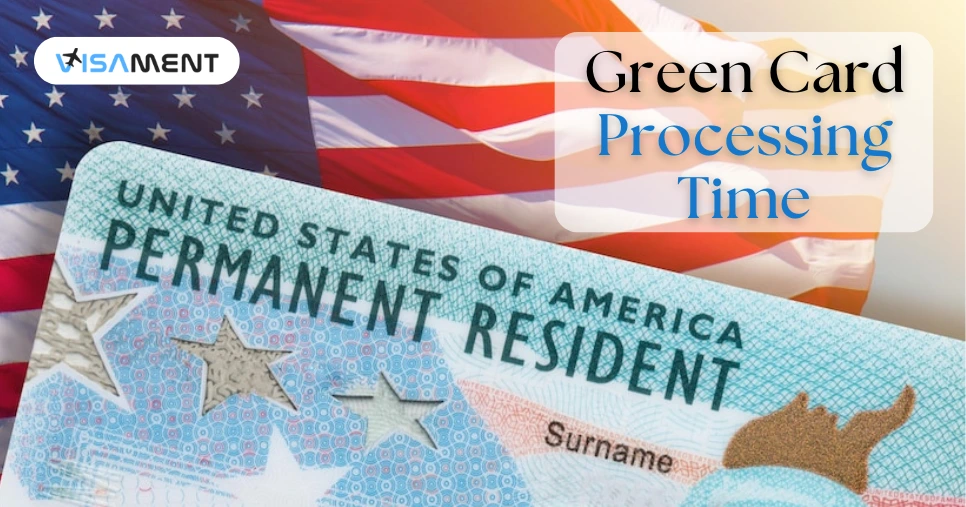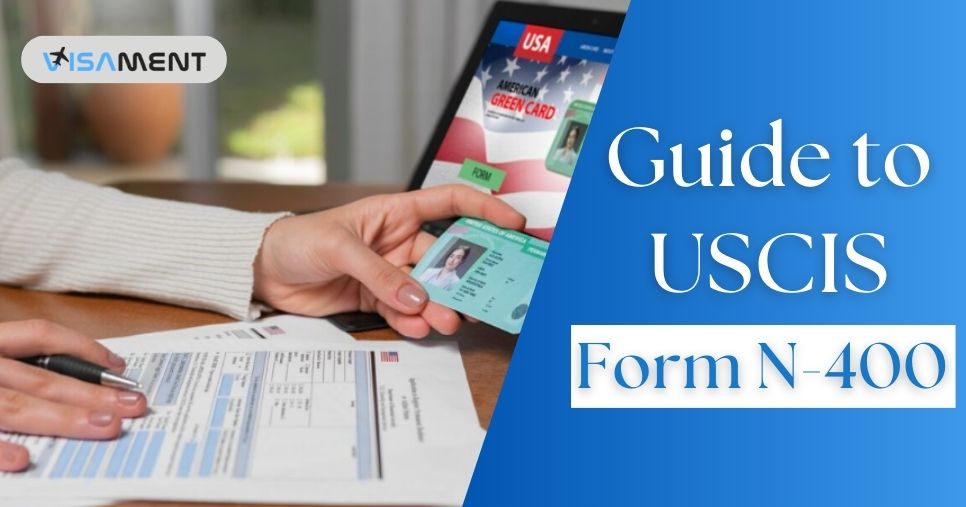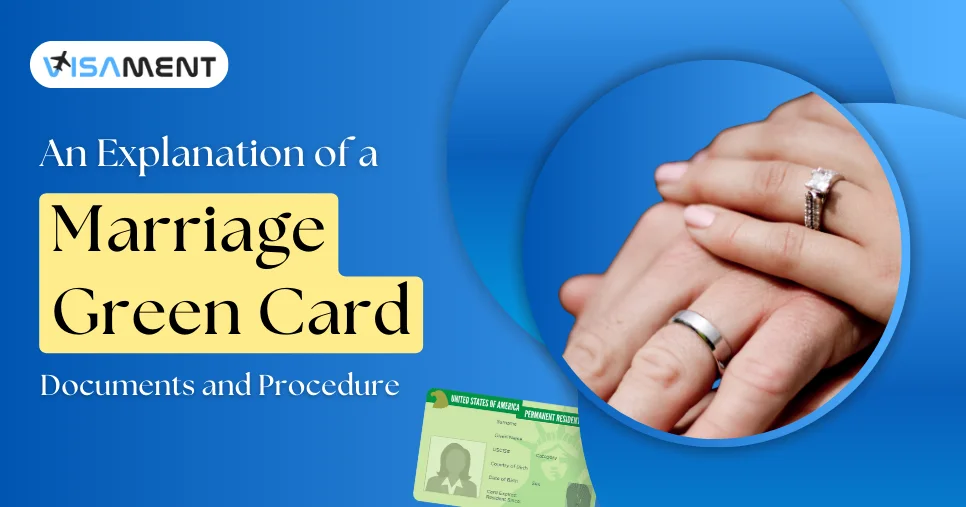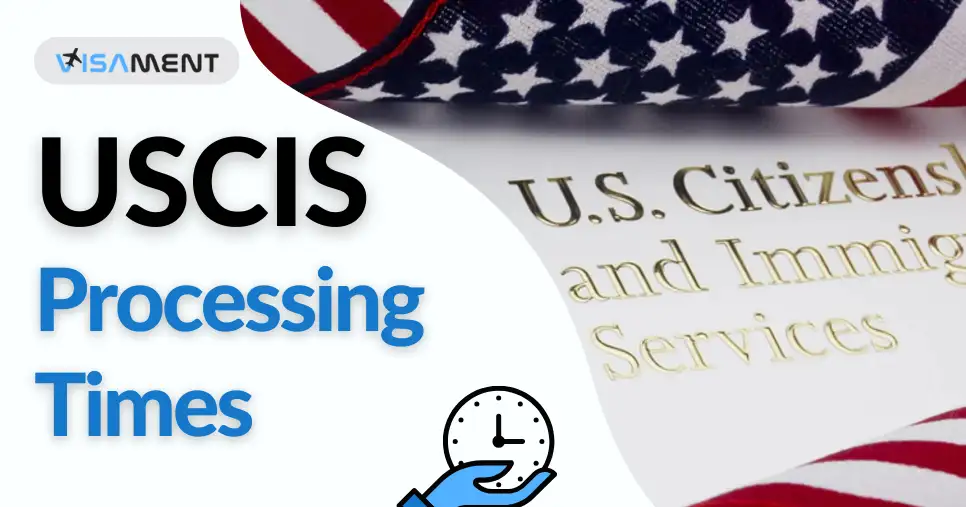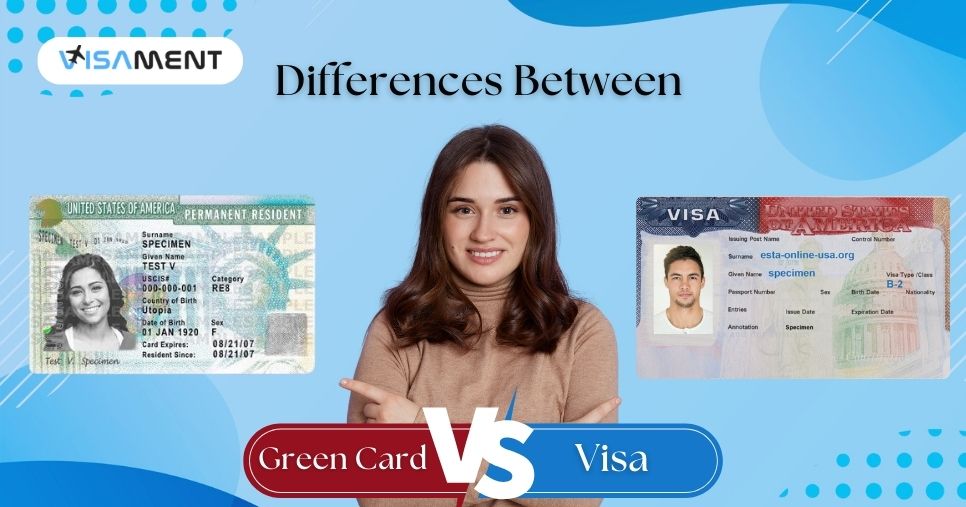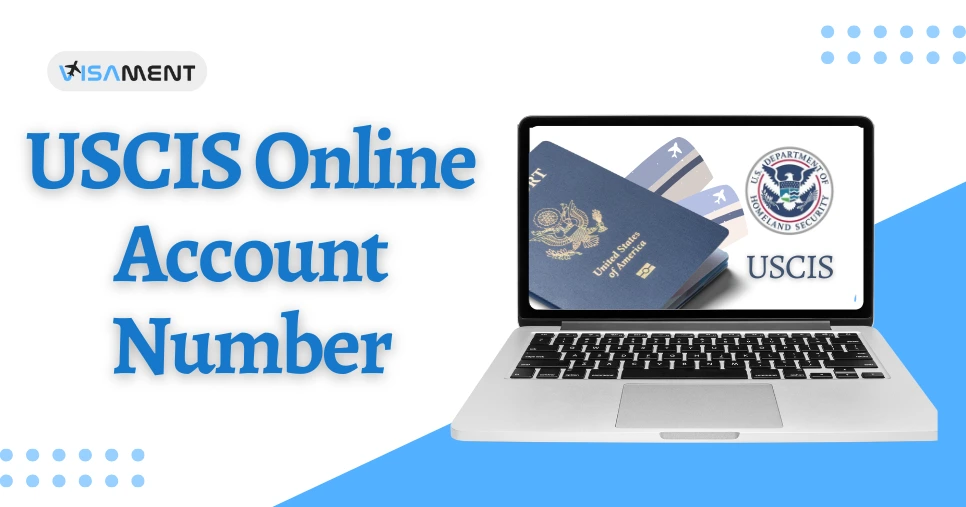- What is a Green Card?
- What are the Types of Green Card Applications?
- How Many Types of Green Cards in the US?
- Different Pathways to Get a Green Card
- What is the Processing Time for a Green Card?
- What is the Cost of a Green Card?
- How to Apply for a Green Card?
- Process to Renew the Green Card
- Conclusion
A green card is a document that confirms a person's status as a lawful permanent resident of the US. It is a card issued by the United States government.
In this blog, we will cover all the information you want to know about a Green Card, including its fees, types of Green Cards, and the application process for a Green Card in the US for permanent residence.
What is a Green Card?
A Green card is a valid document issued by the U.S. government that provides you with a pathway to U.S. citizenship, which takes about 3-5 years. It is also known as a Permanent Resident Card.
This card helps the permanent resident status holder to live, work, or study in the US for an indefinite time.
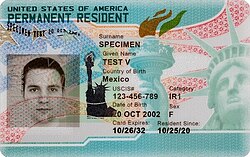
Note: Some people think that a Green Card is like a Visa, but a Green Card and a Visa are different things.
What are the Types of Green Card Applications?
If you want to fill out a green card application, then there are mainly two types of applications.
- Green Card Application in the US: If you are applying in the US, then you need to fill out the Form I-485, which is an application to adjust status.
This form is already used by individuals who are in the US on a non-immigrant visa, and shortlisted for a diversity visa, or eligible for family or employment. - Green card Application outside the US: If you are applying for a Green card application outside the US, then you have to fill out the Form DS-260, which is an Immigrant Visa Electronic Application.
This form is used by those who want to apply for an immigrant visa from foreign countries, through family, diversity visa program, and employer sponsorship.
How Many Types of Green Cards in the US?
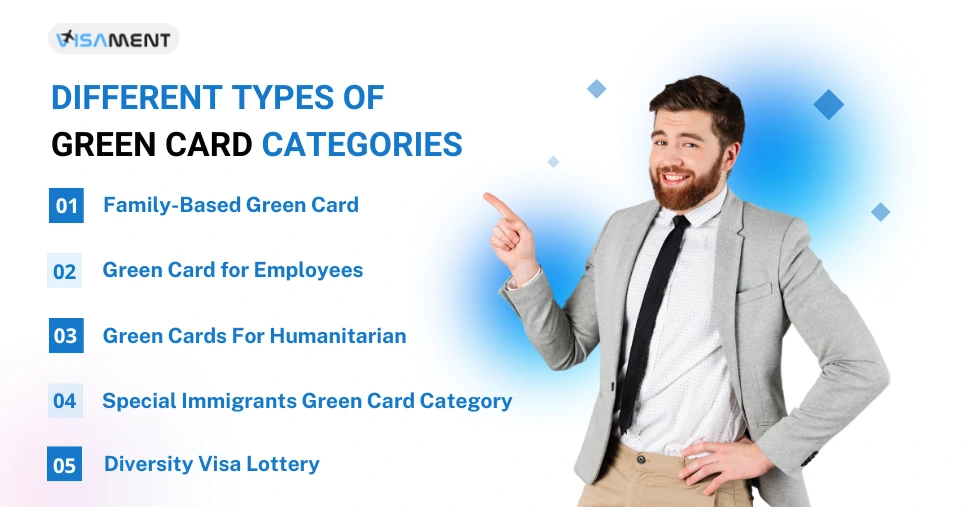
Given below is the detailed information about various types of Green cards in the US.
- Family-based Green card
- Long-time Resident Green Card
- Employment-based Green Card
- Humanitarian Green Card
- Diversity Lottery Green Card
- Other Green Cards
-
Family-based Green card
A family-based green card can be applied for by close relatives of green card holders and US citizens. For a family-based green card, family members, including parents, children, spouse, and siblings, can receive a Green card.
On the family-based green card, widows and widowers, who are married to U.S. citizens, can get a green card, but they must prove that their marriage was legal.
However, some family members are not eligible to apply for a green card on a family basis. It includes uncles, aunts, cousins, and grandparents. They can apply for a Green card if they have close relations with a Green card holder, a US citizen, or are eligible to apply for another type of Green card.
-
Long-time Resident Green Card
A long-time resident green card refers to the people who have physically lived in the US, either documented or undocumented, since January 1, 1972. They can apply for a green card or a permanent resident card through a process called registry.
Here are some of the eligibility criteria that you must meet to apply for a green card through a process called registry.
- You need to prove your entry in the United States before 1 January 1972 by submitting a Form I-94, which is an Arrival/Departure travel record.
- You haven't left the US since you arrived.
- You should not indulge in any type of criminal activity, like fraud, murder, theft, or prostitution.
- You will be eligible for US citizenship through the naturalization process.
- If you have not committed a crime that would make you Deportable. It means you will be forced to be sent back to your home country. These violations include drug abuse, marriage fraud, and smuggling.
- If you have not committed a crime, that would make you inadmissible. It means you cannot get a green card if you have entered in US unlawfully and stayed for more than 6 months in the USA with an expired visa.
-
Employment-based Green Card
The employment-based green card includes many subcategories of workers who can apply for a permanent resident card. In some cases, spouses and their children can be eligible to apply for a green card. See the table given below for more information:
Category Jobs offered E-1 Priority workers They can get jobs in science, arts, business, athletics, education, arts, and as professors and research managers, and executives. EB-2 Professional with advanced degrees and exceptional abilities. Position requires a master's degree, bachelor's degree, minimum of 5 years of experience in sciences, business, or arts. Position of national Interest. EB-2 with a Special waiver for Physicians Who can work in the undeserved area full-time for a limited time period and meet different eligibility criteria. EB-3 Skilled and unskilled professional workers position requires a master's degree, a bachelor's degree, and a minimum of 5 years of experience in arts, science, and business. Position of national interest. EB-4 Special workers Religious workers, media professionals, ministers, Afghanistan, and Iraq nationals who served in the US government. Other employees, family members, and retirees. EB-5 Investors A Non-US national who has invested a minimum of 1 million $ in a US business that will create full-time positions for a minimum of 10 workers. -
Humanitarian Green Card
For Military Family Members (PIP): Parole in Place (PIP) provides a way to lawfully obtain permanent resident status to military families. It includes undocumented spouses, children, and parents of the US military service members (ready reserve, selected reserve, veterans, and active duty).
Under the humanitarian green card for military family members, individuals can apply for parole without leaving the US. This allows them to have a permanent resident status if they are eligible.
However, PIP doesn't provide you with a green card, but it removes hurdles and makes the pathway to permanent residency easier for the family members.
For Refugees and Asylees: For the people who have fear or have been persecuted in their home country because of political opinion, race, religion, or nationality. They can seek protection in the US by applying for a visa abroad (as a refugee) or within the USA (as an asylee).
If they have physically stayed in the USA for a minimum of one year after getting refugee status or asylum, then they can apply for a US permanent resident card and seek protection in the US.
For Human Trafficking Victims: The victims of human trafficking who are residing in the US lawfully or unlawfully can apply for a T visa to stay in the US for a duration of 4 years. However, there is one condition for the T visa that, for human trafficking, they must help to investigate and prosecute the perpetrators. If the victim is below the age of 18 years, then he or she doesn't need help.
To apply for the Permanent Resident card for applicants present in the US, and have a short period of time from the following given below:
- Three years from the date of receiving a T visa.
- The time for investigation and prosecution of human trafficking.
Their eligibility criteria also include good moral character means they don't have not committed any criminal offense, like murder, fraud, from the time they get a T visa until the approval of a green card.
Many family members are also eligible to apply for a green card as long as both the victim and relatives satisfy all the requirements.
For Crime Victims: The victims of crime or mental abuse living in the US lawfully or unlawfully can get protection by applying for a U visa. To get a U visa, victims must obtain a certificate from the law enforcement agency.
As applicants for T visas, U visa applicants also agree to help investigate and prosecute those people who are committing crimes like kidnapping, murder, torture, and sexual assault.
The victim, who wants to apply for a green card, must fulfill the eligibility requirements given below:
- They must have lived in the US for the last 3 years after receiving a U visa.
- They haven't left the US after they applied for a green card until the approval of their application by USCIS.
- If they helped investigators or prosecute people who commit certain crimes from the date of U visa was issued until approved by the USCIS.
The crime victim's spouse, parents, children, and siblings can also be eligible to apply for a green card as long as both the victim and relatives satisfy all the requirements.
For Abuse Victims: The victims of domestic violence (extreme cruelty) can apply for the green card, which would allow them to seek protection and relief under the Violence Against Women Act (VAWA).
This law is generally created for the benefit of women, but also helps men and children who are a part of victims of abuse.
An abuse victim can apply for a green card without the permission of an abusive relative, which includes:
- A former or current spouse who is a green card holder or US citizen.
- It can be a parent who is a U.S. citizen or a green card holder.
- A US citizen child.
For the safety of the victim, USCIS will not notify the abusive relative of the application.
-
Diversity Lottery Green Card
The diversity lottery green card program, which is also known as the Green Card Lottery. Every year, the US government chooses 50,000 people randomly from a pool. It includes six locations, like Asia, South Africa, and Oceania.
Most of the applicants generally cast their votes from their home country. However, some people are from the US, living with a different immigration status.
-
Other Green Cards
The US government has also taken measures to issue other types of green cards. It includes Permanent resident cards for special immigrants, religious workers, media professionals, Afghanistan and Iraq nationals, and people who served in an international organization.
Other includes a green card for the American Indians who were born in India, and Cuban citizens.
Different Pathways to Get a Green Card
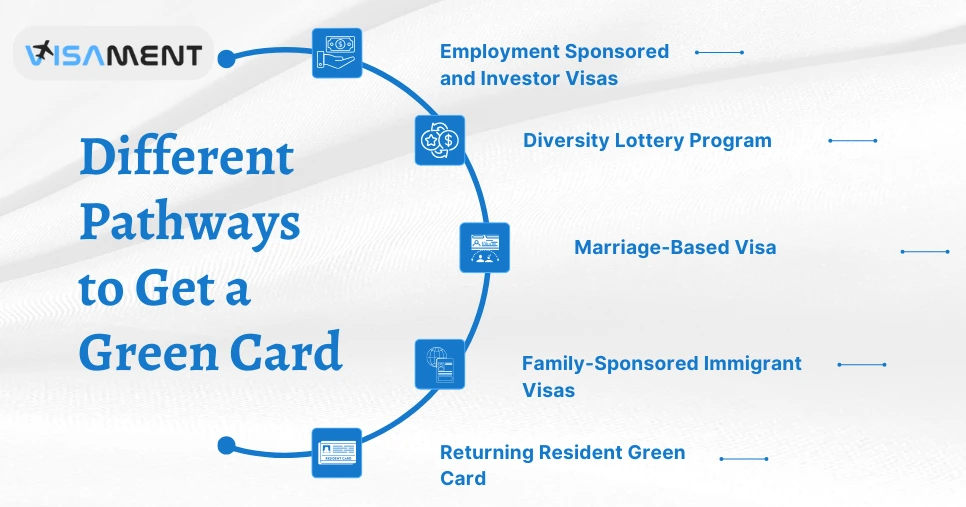
There are typically five ways to get a U.S. green card. Each of them has their requirements and separate visas. Moving further, let's know about them.
- Employment Sponsored and Investor Visas: If you get a job in the United States in that case your employer will pay for the forms. In addition, do the application process and will sponsor your stay in the country.
- Diversity Lottery Program: Every year the United States holds a visa lottery for individuals who belong to countries that have low immigration in the US. If you are eligible for this category you can apply for it and get a diversity visa. After that, you are on your path to get a green card.
- Marriage-Based Visa: Those who get a CR1 or IR1 visa may apply for a U.S. green card.
- Family-Sponsored Immigrant Visas: If you have a close family relative in the US such as parents, siblings, spouses, and children of US citizens you can apply through them for a green card.
- Returning Resident Green Card: It is an additional way for those who held a green card in the past but traveled outside the country. In addition not able to come back for more than one year for reasons that were beyond their control.
These are the different pathways through which you can apply for a U.S. green card. Furthermore, let's now know the process to apply for permanent residency in the country.
What is the Processing Time for a Green Card?
Generally, the processing time for a green card application is from months to many years. However, the major impact of the green card processing time depends on the application type, like as where the application is submitted. Whether it is from the USA or outside the US.
Applying from the US
For the green card application, applied in the US, the processing time for the application will be 8.2 months. The process can also take longer for the application of spouses of US green card holders, US citizens, relatives, and green card holders on an employment basis.
Applying Outside the US
For the US citizens, relatives, and spouses who are applying for a green card application outside the US through consular processing need to wait about 14.5 months for the processing of the application.
For the spouses of US green card apply for a green card outside the U.S., they have to wait for 35 months for the green card application process.
Stop worrying about delays. Apply now and get Indian Counsellor Services.
Chat NowWhat is the Cost of a Green Card?
If an applicant is applying for a green card, then the fees to file a government-based green card are 3005$ if he or she is applying in the US, and 1340$ for the applicant applying outside the US.
How to Apply for a Green Card?
To apply for a green card, you need to follow the steps given below:
- File a petition: You need to file a petition, or some on your behalf has to file a petition.
- Application submission: You need to submit your approved petition and fill out a Green card application from the USCIS or a visa application with the US Department of State.
- Book an Appointment for Biometrics: You need to submit your biometrics, like fingerprints, photos, and a signature.
- Attend an Interview: After the successful appointment and application submission, you need to attend an interview with the immigration officials.
- Get a Decision: You will get a decision on your application.
Process to Renew the Green Card
As stated above, the green card is renewed every 10 years. One should renew it within the expiration of 6 months. For the Renew Green Card process, two methods are available: online application or mail-in format. To renew your card, follow the below-mentioned process:
- Fill out the I-90 green card renewal form. While filling it must select the right reason for applying for the card renewal from the 17 listed reasons.
- The current fee for the green card renewal is $540. The USCIS has fixed this fee and before submission of the document you need to make the payment. In this, the form fee is $455 and a biometric fee is $85 if applicable.
- As per your selected reason the form will instruct you about the required documents that you need to submit.
- To complete the application follow the mentioned instructions in the form. With this, make sure to sign the form since USCIS rejects or returns the applications without signature.
This is how you can renew your green card. Also, through your USCIS online account number, you can check the USCIS case status of your application. For this, you just need to make an online account on the USCIS website, and through the number you can track down your applications.
Conclusion
A green card holder is a resident of the US but not an American citizen. Having this by your side provides you with lots of perks. However, with perks, it does bring some responsibilities that you need to follow. Here the following blog consists of all of the information regarding the card. Moreover, if you need guidance or assistance in any NRI services contact Visament. The experts here hold great knowledge of all these processes and aid you in your smooth travel in the US.
Frequently Asked Questions
The green card allows its holders to work and live in the USA permanently while a visa provides them with a temporary stay for specific reasons like travel, education, or work.
Individuals who have a criminal records, medical issues, public charges, and bad immigration history cannot apply for a U.S. green card.
The quickest way to get a green card is through employment-based visas (EB- visa). In this an individual can self-sponsor themselves, meaning they do not require employment proof or a Labor Certification.
Yes, generally it is considered difficult to get a U.S. green card as the process is complex, consumes a lot of time, and is highly competitive depending on the visa category you applied for. Also, the application process is not straightforward and needs careful documentation and planning.
A green card also known as a permanent resident card allows a foreign individual the right to work and live in the country. In addition, provides the path to becoming a U.S. Citizen after a specific period generally 3-5 years. In contrast to this, U.S. citizenship is the highest legal status of the country and provides individuals with complete rights, responsibilities, and privileges. They can hold public office, serve on juries, and vote in elections. Also, they are eligible to get many state and federal government grants, benefits, and scholarships.
A green card holder must permanently live and move to the United States otherwise he/she may lose their card. In addition, they cannot stay outside the country for more than 6 consecutive months.
A green card can be applied for through Family, through employment, as a special immigrant, Refugee, or asylee status, human trafficking, crime victims, victims of abuse, through registry, and other categories.
To apply for a US citizenship, you must be a valid permanent resident of the US for a period of 5 years. After the completion of 5 years of tenure, you can apply for US citizenship.
To get a green card, you need to follow some steps, which are. First, you need to file a petition, or someone on your behalf has to file an immigrant petition for you, then you need to fill out the green card application, with USCIS, or visa application, and submit your application after the approval of your petition. After that, you need to book an appointment for your biometrics, submit your biometrics, like fingerprints, photos, and signature, then attend an interview with the immigration officials, and wait to get a decision for your application
No, you don't need an immigration lawyer to get a green card. USCIS has made the application process easier so that individuals can apply on their own. However, if you want to get an immigration lawyer, then you can hire one and complete your application process with an easy process and avoid any mistakes.
